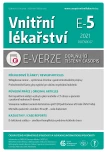Do we care enough about the medication in the elderly? (Case of the geriatric care facility at Military University Hospital Prague)
Authors:
Veronika Krejčí 1; Irena Murínová 1,2; Jana Mohoutová 1; Petra Staňková 1
Authors‘ workplace:
Oddělení klinické farmacie, Ústřední vojenská nemocnice – Vojenská fakultní nemocnice Praha
1; Ústav aplikované farmacie, Farmaceutická fakulta, Masarykova univerzita, Brno
2
Published in:
Vnitř Lék 2021; 67(E-5): 17-22
Category:
Original Contributions
Overview
Objective: The aim of this paper is a complex evaluation of client’s medication in the geriatric care facility Domov Vlčí mák (DVM) with regard to the most common drug related risk factors in elderly. The paper shows ways of identification, resolution and prevention of drug related problems from the perspective of a clinical pharmacist.
Methods: The medication was evaluated in 74 DVM clients. The sample consisted of 45 women (61 %) and 29 men (39 %) with an average age of 90 years. The project took place in the period from April to June 2020. Patient’s pharmacotherapy was graded as low, medium or high risk in accordance with the methodology and concept of clinical pharmaceutical care in the Czech Republic developed by the Czech Professional Society of Clinical Pharmacy ČLS JEP. For all clients, medication was also assessed in terms of the risk of falls.
Results: There was a total of 62 (84 %) high, 4 (5 %) medium and 8 (11 %) low risk clients. A plan for medication adjustments was proposed for a total of 67 clients in the form of pharmacotherapeutic recommendations. A total of 170 drug related problems was identified and pharmacotherapeutic intervention was performed. The most common problem (in 42 % of cases) was a missing drug in terms of effective therapy. Medication discontinuation was recommended in 33 % of cases, mainly due to the risk of side effects, missing indications or drug necessity. Inadequate dosing was found in 15 % of cases, usually it was recommended to reduce the dose to the so-called “senior dose”. In 6 % of cases laboratory testing was indicated and in 4 % of cases timing of the drug administration was changed.
Conclusion: Identified drug related problems did not represent major errors that could endanger the quality or safety of the healthcare provided. One of the reasons for the good outcome is an established multidisciplinary cooperation in this facility.
Keywords:
clinical pharmacist – elderly – multidisciplinary cooperation – polypharmacy – drug related problems
Sources
1. Marek J et al. Markova farmakoterapie vnitřních nemocí. 5. vydání, Grada Publishing: 2019. ISBN 978-80-247-5078-1.
2. Zrubáková K, Krajčík Š. Farmakoterapie v geriatrii. Grada Publishing: 2016. ISBN 978- 80-247-5229-7.
3. Kalafutová S, Šulcová H, Jurášková et al. Farmakoterapie seniorů v domovech důchodců. Geri a Gero 2014; 3(2): 65–70.
4. Halačová M, Plechatá I, Sadilová K et al. Farmakoterapie v domovech pro seniory. Dostupné z www: https://www.pruvodcepacienta.cz/download/co-delame/timeline-detail/ farmakoterapie-v-domovech-pro-seniory_9.pdf.
5. Bartošíková L, Nečas J, Bartošík T et al. Zhodnocení farmakoterapie u geriatrických pacientů ve vybraných domovech důchodců v regionu Brno. Čes Slov Farm 2008; 57(4): 181–186.
6. Dostupné z www: https://www.uvn.cz/cs/domov-vlci-mak-uvod.
7. Gregorová J, Langmaierová K et al. Metodika I: Práce na oddělení klinické farmacie, optimalizace farmakoterpie pacienta. AMCA: Praha, 2013, ISBN 978-80-905449-1-8.
8. Gregorová J, Langmaierová K et al. Klinickofarmaceutická péče v České republice: Popis aktuálního stavu a stanovení cílů. Maxdorf: Praha, 2019: 31–34, ISBN 978- 80-7345-622-1.
9. Dostupné z www: https://www.coskf.cz/deni-v-oboru/vykazy-vykony.
10. O´Mahony D et al. STOPP/START criteria for potentially inappropriate medications/potential prescribing omissions in older people: origin and progress. Expert Rev Clin Pharmacol. 2020; 13(1): 15–22.
11. American Geriatrics Society 2019 Updated AGS Beers Criteria® for Potentially Inappropriate Medication Use in Older Adults, J Am Geriatr Soc. 2019; 67(4): 674–694.
12. Slíva J. Vliv suplementace kalciem a vitaminem D na kostní denzitu, na riziko osteoporotických fraktur a na výskyt pádů u seniorů. Medicína po promoci, 2016; 17(2): 151–152.
13. Bischoff-Ferrari HA, Giovannucci E, Willett WC, Ditrich T, Dawson-Hughes B. Estimation of optimal serum concentrations of 25-hydroxyvitamin D for multiple health outcomes. Am J Clin Nutr 2006; 84: 18–28.
14. Matějovská Kubešová H, Matějovský J, Bielaková K. Může sérová hladina vitaminu D ovlivnit délku hospitalizace seniora? Geri a Gero 2016; 5(4): 181–189.
15. Bretšnajdrová M, Terrichová M, Závodný P. Kalcium a vitamin D u seniorů. Med. praxi 2011; 8(4): 163–166.
16. Topinková E. Racionální farmakoterapie ve stáří. Geriatrie pro praxi Praha: Galén, 2005: 13–19.
17. Šteffl M, Beránková A, Holmerová I et al. Preskripce antipsychotik v českých ústavních zařízeních sociálních služeb pro seniory – výsledky studie DEMDATA, Geri a Gero 2018; 7(3): 106–109.
Labels
Diabetology Endocrinology Internal medicineArticle was published in
Internal Medicine

2021 Issue E-5
Most read in this issue
- D-lactic acidosis – a rare complication of short bowel syndrome
- Do we care enough about the medication in the elderly? (Case of the geriatric care facility at Military University Hospital Prague)
- Whipple disease – systemic disease with gastrointestinal manifestations
- ICU mortality of covid-19 patients – our experience
